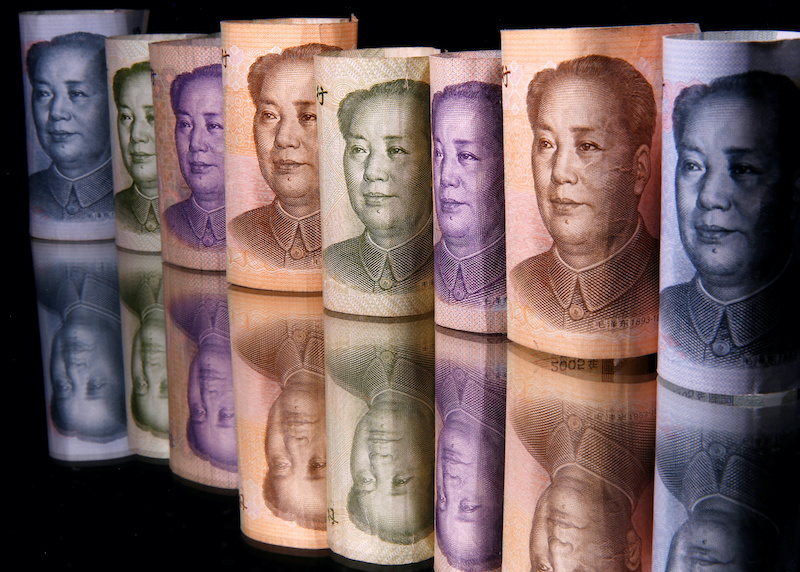China’s yuan declined further to a near 15-year low on Tuesday, after the central bank set the lowest mid-point since 2008.
The yuan’s slide followed a sell-off of Chinese stocks and assets by global investors on Monday spooked by concern about President Xi Jinping’s growing power and fear his pursuit of ideological goals will harm the domestic economy.
US-listed shares of Chinese companies slumped on Monday after President Xi’s new leadership team was unveiled on Sunday.
The selection of loyalists sparked investor concern that further enforcement of tough zero-Covid measures and policies such as ‘common prosperity’, and crackdowns on tech companies will be prioritised at the cost of private sector growth.
The onshore yuan opened 0.5% lower, and finished the domestic session at 7.3085 per dollar, the weakest official close since December 2007.
That followed the People’s Bank of China setting a sharply weaker midpoint rate at 7.1668 per dollar, the lowest since February 15, 2008.
The offshore yuan slipped to as much as 7.3655 per dollar, a new low.
The yuan is suffering from “the double whammy of mounting capital outflow and PBOC’s CNY fixing guidance tweak,” Mizuho Bank strategist Ken Cheung wrote in a note to clients.
He said the end of the 20th Communist Party Congress “marked the beginning of the mega China sell-offs.”
However, the panic selling “was largely driven by sentiment and based on plenty of policy prediction and it could be overdone,” he said, referring to fears that under President Xi Jinping’s third leadership term, China will sacrifice economic growth for ideology and stick with its zero-Covid policy.
China Stocks Slip Again
Hong Kong’s Hang Seng Index, which plunged 6.4% in the previous session, fell 0.1% to a 13-year closing low, wiping out earlier gains. The Hang Seng Tech Index closed 3% higher, after jumping as much as 6.1% following Monday’s market rout.
Stocks on the Mainland also ended in negative territories after giving up earlier gains.
The CSI300 Index fell 0.2%, while the Shanghai Composite Index ended roughly flat.
“Market sentiment on China equities is still weak because of the macroeconomic backdrop, and with the dynamic zero-Covid policy still in place,” said Pruksa Iamthongthong, senior investment director of Asian equities at abrdn.
But valuations are highly supportive following the recent market declines, so “we remain buyers of Chinese equities.”
ALSO SEE:
Unveiling of ‘Team Xi’ Spurs Hong Kong Stock, Yuan Plunge
Authorities Concerned Over Weak Yuan
In the currency market, the yuan almost hit the weak end of its daily trading band for a second consecutive session on Tuesday, despite government moves to ease depreciation pressure.
Regulators on Tuesday raised the cross-border macro prudential adjustment ratio for corporates and financial institutions, making it easier for domestic firms to raise funds from overseas markets, thus encouraging more capital inflows.
In addition, China’s foreign exchange regulator sent a survey to some banks late on Monday asking them about their positioning in the currency market, sources said, signs that authorities are concerned about the yuan’s depreciation.
Mizuho’s Cheung expects the PBOC to continue to narrow the gap between the yuan’s fixing and spot prices gradually to alleviate depreciation pressure, predicting the Chinese currency should start to find its footing below 7.4 level.
In both onshore and offshore yuan markets, volatility implied by 1-month options hit record highs on Tuesday.
- Reuters with additional editing by Jim Pollard
NOTE: This report was updated with details after the close of domestic trading in Hong Kong and on the mainland on October 25, 2022.
ALSO SEE:
More Yen Intervention Suspected, But BOJ Unfazed by Its Slump
Yen Sinks Below 150 to Dollar, Market Watch for Intervention
























